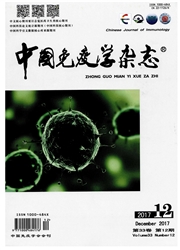

 中文摘要:
中文摘要:
目的:研究外周感染流感病毒H1N1 WSN33后,小鼠在旷场自发行为中的变化规律,探讨外周感染流感病毒对小鼠情绪的影响。方法:通过滴鼻感染H1N1 WSN33或生理盐水,记录BALB/c小鼠两周内的体重变化,以及在旷场行为箱体内5 min的行走总路程、平均运动速度、中央区域运动路程及粪便排泄情况等。结果:外周感染H1N1 WSN33引起小鼠体重急速下降,从第8天开始逐渐恢复。旷场试验中WSN33感染组小鼠行走总路程减少,在感染后的5到10 d总路程减少量差异性比较显著;平均运动速度无统计学差异性;粪便粒数波动较大,无统计学差异。结论:外周感染流感病毒H1N1 WSN33后,BALB/c小鼠自发活动量减少,活动速度基本不变,启示流感病毒感染过程中伴随一定程度的抑郁、焦虑、紧张等情绪,在流感病毒感染的急性期和恢复初期表现比较明显,而紧张情绪表现不太显著。
 英文摘要:
英文摘要:
Objective: To study the rule of spontaneous behavior and to explore the effect on emotion of mice peripherally infected with influenza A WSN33 virus( H1N1 ). Methods: Mice were intranasal inoculated with H1N1 WSN33 or saline. Then mice bodyweight change, and total distance movement, average movement speed distance in the central area and feces in the open field test in 5 minutes were recorded in two weeks. Results: Mice following WSN33 infection boclyweight declined sharply until day 7 post- inoculation, and mice bodyweight recovered from influenza infection at day 8 post-inoculation. Total distance movement of mice following H1N1 WSN33 infection decreased in the open field test,and difference of the reduction was significant from day 5 to day 10 post-inocu- lation. The average movement speed had no statistical difference. The range of numbers of fecal grains was large, and they were no significant difference. Conclusion: The total distance movement decreased, but average movement speed did not change following mice infected with H1N1 WSN33. They told us that mice infected with H1N1 WSN33 had anxiety,depressed and nervous emotion which is more evident in acute stage and early recovery stage, whereas the change of the nervous emotion was small and not obvious.
 同期刊论文项目
同期刊论文项目
 同项目期刊论文
同项目期刊论文
 Drug Screening for Autophagy Inhibitors Based on the Dissociation of Beclin1-Bcl2 Complex Using BiFC
Drug Screening for Autophagy Inhibitors Based on the Dissociation of Beclin1-Bcl2 Complex Using BiFC Inability of NS1 protein from an H5N1 influenza virus to activate PI3K/Akt signaling pathway correla
Inability of NS1 protein from an H5N1 influenza virus to activate PI3K/Akt signaling pathway correla Identificationof23-(S)-2-Amino-3-Phenylpropanoyl-Silybin as an Antiviral Agent for Influenza A Virus
Identificationof23-(S)-2-Amino-3-Phenylpropanoyl-Silybin as an Antiviral Agent for Influenza A Virus Identification of 23-(S)-2-Amino-3-Phenylpropanoyl-Silybin as an Antiviral Agent for Influenza A Vir
Identification of 23-(S)-2-Amino-3-Phenylpropanoyl-Silybin as an Antiviral Agent for Influenza A Vir 期刊信息
期刊信息
